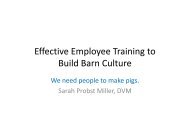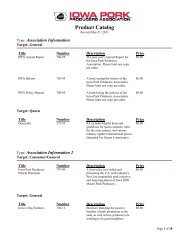September 2011 - Iowa Pork Producers Association
September 2011 - Iowa Pork Producers Association
September 2011 - Iowa Pork Producers Association
Create successful ePaper yourself
Turn your PDF publications into a flip-book with our unique Google optimized e-Paper software.
‘It’s too damned hot for man or beast!’<br />
By Kelley J. Donham MS, DVM, professor of Occupational and Environmental Health, director of <strong>Iowa</strong>’s<br />
Center for Agricultural Safety and Health (I-CASH), University of <strong>Iowa</strong><br />
My pork producing dad used to say frequently, “It’s<br />
too damned hot for man or beast.” This summer<br />
has been no exception. My dad’s words rang in my<br />
ears the first time many years ago, as I staggered<br />
out of the haymow after stacking bales up under<br />
the roof on a 100° F.-plus day. I was weak, dizzy,<br />
confused and thirsty. My head hurt and I remember<br />
I was so tired; I could hardly walk up the hill to the<br />
house. After sitting down in the shade, drinking<br />
about a gallon of sweet iced tea and consuming<br />
three ham salad sandwiches, I started feeling better.<br />
This was one of two times doing farm work that<br />
I experienced these symptoms that I now know<br />
was heat exhaustion (the first signs of the serious<br />
condition heat stroke).<br />
Later in life, as a practicing swine veterinarian, I<br />
was called to a farm during another hot spell. I<br />
walked into a 500-head-capacity building holding<br />
40 lb. feeders – and found 500 pigs – all dead! The<br />
ventilation had failed during the night and they<br />
died of heat stroke.<br />
Pigs and people are alike in many more ways than<br />
just having the proclivity to eat until we are fat. We<br />
are alike in that overheating can be deadly. However,<br />
we have the advantage in that we sweat, an extremely<br />
effective way to help keep us cool. As sweat<br />
evaporates from our skin, it can remove nearly 2/3 of<br />
the heat we generate when working. Pigs (like dogs<br />
and cats) only sweat on their noses and foot pads,<br />
not much help in cooling off. They have to rely on<br />
panting, air movement and radiating their body heat<br />
to a cool body (like a cement floor or water).<br />
If you believe in global climate change (or not),<br />
regardless, we are having and probably will have<br />
more “too damned hot days.” We need to be prepared<br />
to prevent the detrimental effects of heat for our own<br />
health, the health of our family members, employees<br />
and of course, the pigs. The basic take-home messages<br />
follow and include: 1) the stages of heat illness and<br />
symptoms in people; 2) prevention of heat illness in<br />
people; 3) the concept of heat index; and 4) prevention<br />
of heat illness in pigs.<br />
Table 1: Stages of heat illness, symptoms and<br />
prevention in people (from mild to severe)<br />
• Heat cramps<br />
• Dehydration with loss of salts from the body<br />
• Weakness, muscle spasms, dizziness and<br />
vomiting (often seen in football players in hot<br />
weather)<br />
• Cool off, drink water supplemented with salt,<br />
or better yet, a balanced sports drink (e.g.,<br />
Gatorade)<br />
• Heat exhaustion<br />
• Long work periods in hot environments,<br />
dehydration and loss of body salts<br />
• Extreme fatigue, thirst, headache, dizziness,<br />
confusion and body temperature above normal<br />
(greater than 38° C. or 100° F.)<br />
• May lead to syncope (fainting) and heat stroke<br />
if not attended to<br />
• Prevention is taking more frequent breaks,<br />
shade, maintaining hydration by drinking<br />
at least 1.5 liters per hour (even if not thirsty),<br />
and avoiding alcohol and tobacco. Wear<br />
loose fitting “wicking” clothing that will allow<br />
evaporation, such as polyester sport shirts<br />
30 SEPTEMBER <strong>2011</strong>













